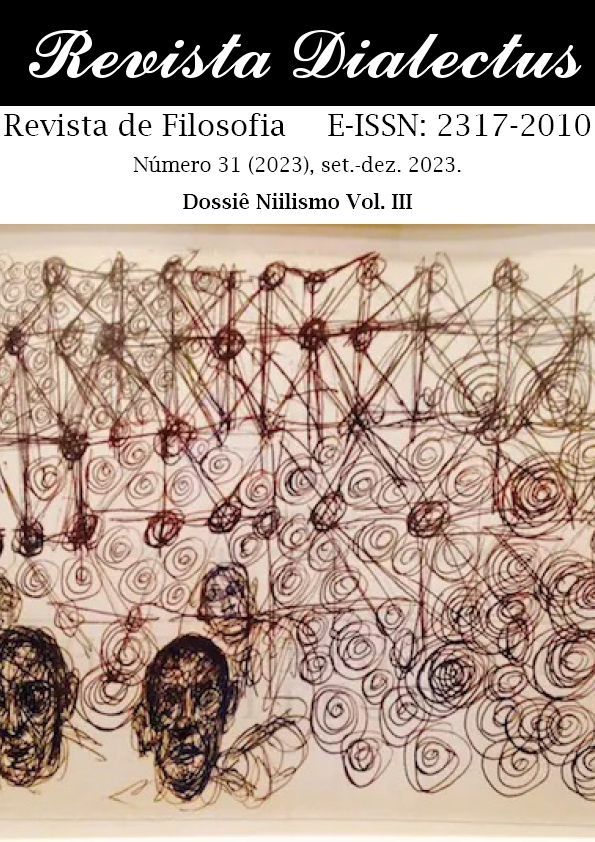NIHILISMO: UN PROBLEMA JAPONÉS
DOI:
https://doi.org/10.30611/2023n31id92702Keywords:
Religión, Subjetividad, Existencialismo, Escuela de Kioto, Nishitani KeijiAbstract
En este artículo examinamos el fenómeno del nihilismo desde la perspectiva del filósofo de la Escuela de Kioto, Nishitani Keiji (1900-1990). Es ampliamente aceptado que el nihilismo como fenómeno histórico surgió en Europa a raíz de una crisis generada por la ruptura con el fundamento religioso cristiano, lo que llevó a una pérdida de sentido y propósito existencial. Nishitani desarrolla su análisis filosófico e histórico del fenómeno en su obra "Nihilismo", donde investiga la cuestión desde la literatura de Fiodor Dostoevski y también analiza las perspectivas de importantes filósofos como Hegel, Schopenhauer, Kierkegaard, Max Stirner, Nietzsche y Heidegger. Sin embargo, en dicha obra, Nishitani desafía el conseso y sostiene que el nihilismo también ha sido un problema enfrentado por el pueblo japonés, y que los filósofos japoneses de la época lo diagnosticaron tardíamente. En este artículo nos centramos principalmente en la obra "Nihilismo" de Nishitani, para concluir cómo este filósofo percibió el nihilismo como un problema específicamente japonés, irreparablemente relacionado con la religión y la introducción y reproducción de la concepción de la subjetividad moderna en Japón a partir de la euroamericanización del país.
Downloads
References
GILLESPIE, M. A. Nihilism Before Nietzsche. Chicago: University of Chicago Press, 1995.
NIETZSCHE, F. W. Fragmentos Póstumos (1885-1888). In: LLINARES, J.B. (Ed.). Nietzsche. Antología. Barcelona: Península, 1988, pp. 147-294.
NISHITANI, K. The Religious Situation in Present-Day Japan. Contemporary Religions in Japan, vol. 1, 1960, pp. 7-24.
____. The Starting Point of My Philosophy. Translated by Jeff Shore. FAS Society Journal, 1986, pp. 24–29.
____. The Self-Overcoming of Nihilism. Translated by Graham Parkes and Setsuko Aihara. Albany: SUNY Press, 1990.
____. Mon point de départ philosophique. Translated by Sylvain Isaac. Laval théologique et philosophique, vol. 64, no. 2, 2008, pp. 295-303.
____. El significado del nihilismo para Japón. In: HEISIG, J., KASULIS, T., & MARALDO, J. (Eds.). La filosofía japonesa en sus textos. Coordinated translation by Raquel Bouso García. Barcelona: Herder, 2016, pp. 736-743.
____. La Religión y la Nada. Translated by Raquel Bouso. Chisokudō Publications, 2017. Revised edition.
PRAZERES, A. S. F. A experiência religiosa e a superação da modernidade em Nishitani Keiji. In: MORISATO, T. (ed.). Critical Perspectives on Japanese Philosophy. Chisokudo Publications & Nanzan Institute for Religion and Culture, 2016. pp. 193-218.
STOREY, D. Nihilism, Nature, And the Collapse of the Cosmos. Cosmos and History: The Journal of Natural and Social Philosophy, vol. 7, no. 2, 2011, pp. 6-25.
Downloads
Published
Issue
Section
License
Copyright (c) 2023 Amanda Sayonara Fernandes Prazeres

This work is licensed under a Creative Commons Attribution-NonCommercial-NoDerivatives 4.0 International License.
Authors who publish in this journal agree to the following terms:
- Authors retain the copyright and grant the journal the right of first publication, with the work simultaneously licensed under the Attribution-NonCommercial-NoDerivatives 4.0 International (CC BY-NC-ND 4.0) License, which allows the non-commercial sharing of work, without modifications and with acknowledgment of authorship and initial publication in this journal.
- Authors are authorized to take additional contracts separately, for non-exclusive distribution of the version of the work published in this journal (eg publish in institutional repository or as a book chapter), with acknowledgment of authorship and initial publication in this journal.
- Authors are allowed and encouraged to publish and distribute their work online (eg in institutional repositories or on their personal page) at any point before or during the editorial process, as this can generate productive changes as well as increase the impact and citation of published work (See The Free Access Effect).



















